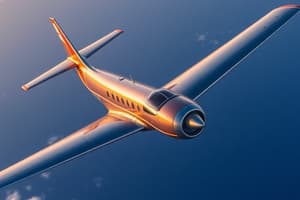Podcast
Questions and Answers
What does 'VY' signify in aerodynamics?
What does 'VY' signify in aerodynamics?
- The rough-air or turbulence speed
- The speed for maximum rate of climb (correct)
- The reference landing speed
- The stalling speed CAS
Which abbreviation refers to the reference stalling speed CAS in the landing configuration?
Which abbreviation refers to the reference stalling speed CAS in the landing configuration?
- VX
- VSR0 (correct)
- VSW
- VS1g
Which unit is associated with the concept of force, acting on a body by gravity?
Which unit is associated with the concept of force, acting on a body by gravity?
- Newton (N) (correct)
- Pound (lb)
- Kilogram (kg)
- Joule (J)
What does 'VS0' represent?
What does 'VS0' represent?
What does 'VSW' indicate in aerodynamics?
What does 'VSW' indicate in aerodynamics?
What is the main purpose of the manual in relation to the works in the bibliography?
What is the main purpose of the manual in relation to the works in the bibliography?
As of what date were the references quoted in the manual current?
As of what date were the references quoted in the manual current?
Which of the following statements is true about the manual's references?
Which of the following statements is true about the manual's references?
How should the works mentioned in the bibliography be utilized according to the manual?
How should the works mentioned in the bibliography be utilized according to the manual?
What does the manual explicitly state regarding the works in its bibliography?
What does the manual explicitly state regarding the works in its bibliography?
What role does the wealth of knowledge in the aerospace industry play?
What role does the wealth of knowledge in the aerospace industry play?
Which of these is likely a result of combining knowledge in the aerospace industry?
Which of these is likely a result of combining knowledge in the aerospace industry?
Who can benefit from the knowledge in aerospace fields?
Who can benefit from the knowledge in aerospace fields?
What is one of the challenges faced by new entrants in the aerospace industry?
What is one of the challenges faced by new entrants in the aerospace industry?
Which statement best reflects the relationship between professionals and newcomers in the aerospace industry?
Which statement best reflects the relationship between professionals and newcomers in the aerospace industry?
At what temperature does water freeze on this temperature scale?
At what temperature does water freeze on this temperature scale?
What is the boiling point of water at mean sea level on this temperature scale?
What is the boiling point of water at mean sea level on this temperature scale?
Which of the following temperatures indicates the freezing point of water?
Which of the following temperatures indicates the freezing point of water?
Which statement accurately describes the temperature scale mentioned?
Which statement accurately describes the temperature scale mentioned?
What is the temperature at mean sea level where water boils on this temperature scale?
What is the temperature at mean sea level where water boils on this temperature scale?
What is the primary reason people find the term 'weight' confusing when 'mass' is used?
What is the primary reason people find the term 'weight' confusing when 'mass' is used?
Which statement about the terms 'weight' and 'mass' is accurate?
Which statement about the terms 'weight' and 'mass' is accurate?
Why might someone misunderstand the difference between mass and weight?
Why might someone misunderstand the difference between mass and weight?
In what context is the distinction between weight and mass particularly significant?
In what context is the distinction between weight and mass particularly significant?
What misconception might lead someone to think weight is the same as mass?
What misconception might lead someone to think weight is the same as mass?
What is influenced by the moment arm in yaw control?
What is influenced by the moment arm in yaw control?
Which axis is primarily associated with roll control in an aircraft?
Which axis is primarily associated with roll control in an aircraft?
What type of flow involves layers of air sliding over one another smoothly?
What type of flow involves layers of air sliding over one another smoothly?
In which scenario is the critical power unit significant?
In which scenario is the critical power unit significant?
What is the purpose of vortex generators on an aircraft?
What is the purpose of vortex generators on an aircraft?
What happens to the angle of attack during a pitch-up maneuver?
What happens to the angle of attack during a pitch-up maneuver?
Which control surface is used primarily for adjusting pitch?
Which control surface is used primarily for adjusting pitch?
What effect does increasing the control surface area have on lift?
What effect does increasing the control surface area have on lift?
Which maneuver would likely lead to leading-edge separation?
Which maneuver would likely lead to leading-edge separation?
What does Vmc represent in aviation terminology?
What does Vmc represent in aviation terminology?
Which type of boundary layer is characterized by a smooth airflow with minimal turbulence?
Which type of boundary layer is characterized by a smooth airflow with minimal turbulence?
What design feature allows for high-speed ailerons to function effectively?
What design feature allows for high-speed ailerons to function effectively?
What is the main purpose of a stabilator?
What is the main purpose of a stabilator?
Which component is primarily responsible for yaw control?
Which component is primarily responsible for yaw control?
Flashcards
Aerospace Industry Expertise
Aerospace Industry Expertise
The aerospace industry combines knowledge and expertise from multiple fields to create advanced and challenging products.
Knowledge Sharing in Aerospace
Knowledge Sharing in Aerospace
Experienced professionals in aerospace contribute their knowledge to benefit others in the industry and new entrants.
Aerospace Education
Aerospace Education
Universities play a role in preparing individuals for careers in aerospace by providing relevant education.
Collaboration in Aerospace
Collaboration in Aerospace
Signup and view all the flashcards
Manual's Purpose
Manual's Purpose
Signup and view all the flashcards
References Date
References Date
Signup and view all the flashcards
Mass
Mass
Signup and view all the flashcards
Weight
Weight
Signup and view all the flashcards
Mass vs. Weight
Mass vs. Weight
Signup and view all the flashcards
Inertia
Inertia
Signup and view all the flashcards
Gravity
Gravity
Signup and view all the flashcards
VS0 (Stalling Speed CAS)
VS0 (Stalling Speed CAS)
Signup and view all the flashcards
VS1 (Stalling Speed CAS)
VS1 (Stalling Speed CAS)
Signup and view all the flashcards
VS1g (Stalling Speed CAS at 1g)
VS1g (Stalling Speed CAS at 1g)
Signup and view all the flashcards
VSW (Stall Warning Speed)
VSW (Stall Warning Speed)
Signup and view all the flashcards
VY (Maximum Rate of Climb Speed)
VY (Maximum Rate of Climb Speed)
Signup and view all the flashcards
Celsius Scale
Celsius Scale
Signup and view all the flashcards
Mean Sea Level
Mean Sea Level
Signup and view all the flashcards
Aerodynamics
Aerodynamics
Signup and view all the flashcards
Drag
Drag
Signup and view all the flashcards
Thrust
Thrust
Signup and view all the flashcards
Longitudinal Axis
Longitudinal Axis
Signup and view all the flashcards
Lateral Axis
Lateral Axis
Signup and view all the flashcards
Normal Axis
Normal Axis
Signup and view all the flashcards
Elevators
Elevators
Signup and view all the flashcards
Pitch Control
Pitch Control
Signup and view all the flashcards
Moment Arm
Moment Arm
Signup and view all the flashcards
Angle of Attack
Angle of Attack
Signup and view all the flashcards
Variable Incidence Tailplane
Variable Incidence Tailplane
Signup and view all the flashcards
Stabilator
Stabilator
Signup and view all the flashcards
Elevons
Elevons
Signup and view all the flashcards
Rudder
Rudder
Signup and view all the flashcards
Yaw Control
Yaw Control
Signup and view all the flashcards
Moment Arm (Yaw)
Moment Arm (Yaw)
Signup and view all the flashcards
Engine-Induced Yaw
Engine-Induced Yaw
Signup and view all the flashcards
Minimum Control Speeds
Minimum Control Speeds
Signup and view all the flashcards
Study Notes
Basic Aerodynamics
-
Aircraft Axes and Planes of Rotation:
- Longitudinal (roll) axis
- Lateral (pitch) axis
- Normal (yaw) axis
-
Flight Controls: These manage aircraft movement.
-
Elevators: Control pitch.
-
Pitch Control:
- Control surface area impacts pitch.
- Control surface angular deflection affects pitch.
- The moment arm influences pitch changes.
- Angle of attack also plays a role in pitch.
-
Alternative Pitch Controls:
- Variable incidence tailplane: A tailplane that adjusts its angle of attack.
- Stabilator: combines elevator and stabilizer functions
- Elevons: control both aileron and elevator functions
-
Rudder: Controls yaw.
-
Yaw Control:
- Area of the control surface is a factor in yaw.
- Control surface deflection influences yaw.
- Moment arm affects yaw control.
- Engine-induced yaw is a phenomenon affecting yaw.
-
Asymmetric Engine Yawing Moment: This occurs when an engine produces more thrust than the opposite engine.
- Critical power unit is the key factor in this moment.
-
Asymmetric Rolling Moment: Unbalanced force creating roll.
-
Minimum Control Speeds:
- Take-off speeds.
- Landing speeds.
- Vmc and Vmcg are minimum control speeds
- Factors affecting Vmcg and Vmc are covered.
- Vmcl, the minimum control speed for landing in a particular configuration, is also vital.
- Vmcl(1out) is a specific Vmcl case.
- Vmcl-2 is another variant of Vmcl.
- Factors impacting Vmcl are detailed.
-
Ailerons: These control roll.
-
Roll Control: Ailerons and related controls manage roll
- Flaperons are an aileron variant
-
Wing Twist:
- Geometry of twist.
- Aerodynamic twist
- Twisterons: Twisting ailerons
- High-speed twist: A further variation in twist.
- A comparison between high and low speed ailerons.
- Roll spoilers.
Lift Generation
-
Turbulent Flow: A type of airflow.
-
Streamline Flow: Another type of airflow, with a smooth, predictable flow.
-
Boundary Layer: A layer of air adjacent to a wing's surface.
-
Laminar Boundary Layer: Smooth airflow near the wing surface.
- Transition point is the location where the flow transitions.
-
Turbulent Boundary Layer: Rough airflow near the wing surface.
- Leading-edge separation creates a boundary layer problem
-
Boundary-Layer Control: Methods to modify the boundary layer.
- Blowing: adds air to the boundary layer.
- Suction: removes air from the boundary layer.
- Vortex generators: create vortices in the boundary layer.
-
Two-Dimensional Flow: Analyzing airflow in a 2D plane.
-
Stagnation Point: Point on an aerofoil where airflow joins the surface.
- Impact of airflow on upper and lower surfaces of an aerofoil.
-
Lift Production: - The generation of lift using various aerofoils. - Symmetrical and cambered aerofoils.
-
Abbreviations:
- VS: Stalling speed
- VS0: Stalling speed (flaps at landing position).
- VS1: Configuration-specific stalling speed.
- VS1g: Stalling speed at 1g.
- VSR: Reference stalling speed
- VSR0: Reference stall speed (landing config).
- VSR1: Configuration-specific reference stall speed.
- VSW: Speed at which stall warning activates.
- VX: Speed at which maximum climb gradient achieved.
- VY: Speed at which maximum rate of climb attained.
- WC: Wind component.
- WED: Water-equivalent depth.
-
Weight and Mass: Difference between weight (force) and mass (amount of matter).
Studying That Suits You
Use AI to generate personalized quizzes and flashcards to suit your learning preferences.




